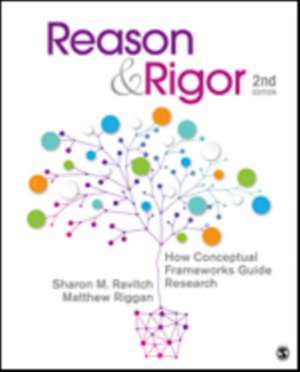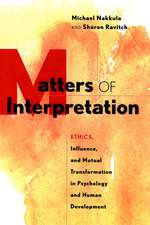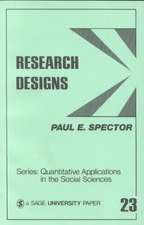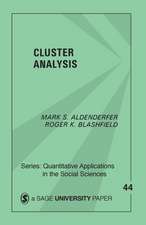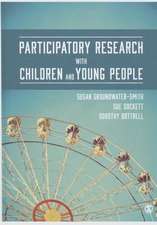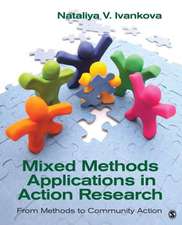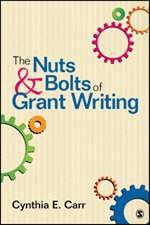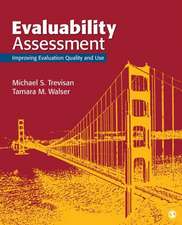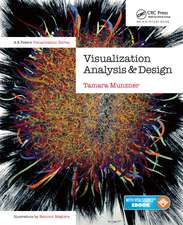Reason & Rigor: How Conceptual Frameworks Guide Research
Autor Sharon M. Ravitch, J. Matthew Rigganen Limba Engleză Paperback – 15 mar 2016
Chapter 8 is the second new chapter and provides a student's perspective on the role of conceptual frameworks in the research process from beginning to end. Many more visuals have been included which assist in illustrating key ideas and relationships providing a clear roadmap for the reader, combined with a thorough updating of the relevant research.
Preț: 516.93 lei
Preț vechi: 698.54 lei
-26% Nou
Puncte Express: 775
Preț estimativ în valută:
98.92€ • 103.54$ • 82.33£
98.92€ • 103.54$ • 82.33£
Carte disponibilă
Livrare economică 10-24 martie
Livrare express 21-27 februarie pentru 25.66 lei
Preluare comenzi: 021 569.72.76
Specificații
ISBN-13: 9781483340401
ISBN-10: 1483340406
Pagini: 264
Dimensiuni: 187 x 232 x 21 mm
Greutate: 0.36 kg
Ediția:Second Edition
Editura: SAGE Publications
Colecția Sage Publications, Inc
Locul publicării:Thousand Oaks, United States
ISBN-10: 1483340406
Pagini: 264
Dimensiuni: 187 x 232 x 21 mm
Greutate: 0.36 kg
Ediția:Second Edition
Editura: SAGE Publications
Colecția Sage Publications, Inc
Locul publicării:Thousand Oaks, United States
Recenzii
“[The Second Edition] does a better job than any other text I’ve read of demystifying research by emphasizing the process rather than the strategies.”
“[This book] is a very good examination of the ways conceptual frameworks play themselves out in different contexts examining the different aspects of the conceptual frameworks as they appear in literature that has been published (including the dissertation).”
“[This text] provides an excellent overview of the use of conceptual frameworks to guide research.”
“[This book] is a very good examination of the ways conceptual frameworks play themselves out in different contexts examining the different aspects of the conceptual frameworks as they appear in literature that has been published (including the dissertation).”
“[This text] provides an excellent overview of the use of conceptual frameworks to guide research.”
Cuprins
Chapter 1: Introduction to Conceptual Frameworks
Conceptual Frameworks Explored and Defined
Elements of a Conceptual Framework
Organization of this Book
Concluding Thoughts: Using Conceptual Frameworks
Chapter 2: Why Conceptual Frameworks?
What (and Where) is Theory?
Whose Theory is It, and Where Does It Come From?
What is a Literature Review, and What is It For?
The Case for Conceptual Frameworks: Concluding Thoughts
Chapter 3: Origins of a Conceptual Framework: The Birth of Grit
Background and context: An overview of the work in focus
The argument
Origins: Conversations with the dead and the living
Formulating the concept: From conversing to inquiring
Forming and advancing the argument
Chapter 4: Excavating Questions
“Excavating” Research Questions
About the Author
Background and Context: An Overview of the Work in Focus
The Argument
Conceptual Frameworks and Research Design
The Co-evolution of Conceptual Frameworks and Research Design
Conceptual Frameworks and Research Design: Concluding Thoughts
Reflection Questions
Chapter 5: The Role of the Conceptual Framework in Data Collection and Fieldwork
Who You Are, How You Think, and What You Study
About the Author
Background and Context: An Overview of the Work in Focus
The Argument
Hyphenated Selves as a Theoretical Framework
The Hyphen as Method: Positionality and Practice
Conceptual Frameworks and Fieldwork: Concluding Thoughts
Chapter 6: Conceptual Frameworks and the Analysis of Data
Examining the Influence of an Ever-Emerging Conceptual Framework
About the Author
Background and Context: An Overview of the Work in Focus
The Argument
From Argument to Analysis
Transcription as Data Analysis
Evolving and Shifting Frameworks of Analysis
Conceptual Frameworks and Data Analysis: Concluding Thoughts
Chapter 7: Expanding the Conversation, Extending the Argument: The Role of Conceptual Frameworks in Presenting, Explaining, and Contextualizing Findings
About the Author
Background and Context: AN OVERVIEW OF THE WORK IN FOCUS
Being in Conversation With Theory: Influences on Thought and Action
The Argument
Conclusion
Chapter 8: Reflections on the Making and Re-making of a Conceptual Framework - William K. Dunworth
Developing a Conceptual Framework
Challenges in the field
Revisiting Conceptual Frameworks: Turning Artifacts into Processes
“Everything is data”: Returning to the field
Revising the conceptual framework and integrating findings
Chapter 9: The Conceptual Framework as Guide and Ballast
Developing a Conceptual Framework
Starting Points: Self and Audience
Making—and Breaking—Your Plans
The Conversation: From Listening to Speaking
Strategies and Exercises for Developing Conceptual Frameworks
Identifying Your Interests, Beliefs, and Motivations for Doing Research
Examination of the “Conversations Already Happening”
Ongoing Questions and Concerns about the Research
Concept Maps
Research Memos
Research Journal
Reason and Rigor
Conceptual Frameworks Explored and Defined
Elements of a Conceptual Framework
Organization of this Book
Concluding Thoughts: Using Conceptual Frameworks
Chapter 2: Why Conceptual Frameworks?
What (and Where) is Theory?
Whose Theory is It, and Where Does It Come From?
What is a Literature Review, and What is It For?
The Case for Conceptual Frameworks: Concluding Thoughts
Chapter 3: Origins of a Conceptual Framework: The Birth of Grit
Background and context: An overview of the work in focus
The argument
Origins: Conversations with the dead and the living
Formulating the concept: From conversing to inquiring
Forming and advancing the argument
Chapter 4: Excavating Questions
“Excavating” Research Questions
About the Author
Background and Context: An Overview of the Work in Focus
The Argument
Conceptual Frameworks and Research Design
The Co-evolution of Conceptual Frameworks and Research Design
Conceptual Frameworks and Research Design: Concluding Thoughts
Reflection Questions
Chapter 5: The Role of the Conceptual Framework in Data Collection and Fieldwork
Who You Are, How You Think, and What You Study
About the Author
Background and Context: An Overview of the Work in Focus
The Argument
Hyphenated Selves as a Theoretical Framework
The Hyphen as Method: Positionality and Practice
Conceptual Frameworks and Fieldwork: Concluding Thoughts
Chapter 6: Conceptual Frameworks and the Analysis of Data
Examining the Influence of an Ever-Emerging Conceptual Framework
About the Author
Background and Context: An Overview of the Work in Focus
The Argument
From Argument to Analysis
Transcription as Data Analysis
Evolving and Shifting Frameworks of Analysis
Conceptual Frameworks and Data Analysis: Concluding Thoughts
Chapter 7: Expanding the Conversation, Extending the Argument: The Role of Conceptual Frameworks in Presenting, Explaining, and Contextualizing Findings
About the Author
Background and Context: AN OVERVIEW OF THE WORK IN FOCUS
Being in Conversation With Theory: Influences on Thought and Action
The Argument
Conclusion
Chapter 8: Reflections on the Making and Re-making of a Conceptual Framework - William K. Dunworth
Developing a Conceptual Framework
Challenges in the field
Revisiting Conceptual Frameworks: Turning Artifacts into Processes
“Everything is data”: Returning to the field
Revising the conceptual framework and integrating findings
Chapter 9: The Conceptual Framework as Guide and Ballast
Developing a Conceptual Framework
Starting Points: Self and Audience
Making—and Breaking—Your Plans
The Conversation: From Listening to Speaking
Strategies and Exercises for Developing Conceptual Frameworks
Identifying Your Interests, Beliefs, and Motivations for Doing Research
Examination of the “Conversations Already Happening”
Ongoing Questions and Concerns about the Research
Concept Maps
Research Memos
Research Journal
Reason and Rigor
Descriere
With new coverage of how conceptual frameworks are conceptualized and developed and of a student's perspective on the role of conceptual frameworks, this book presents conceptual frameworks as a mechanism - process and product.
